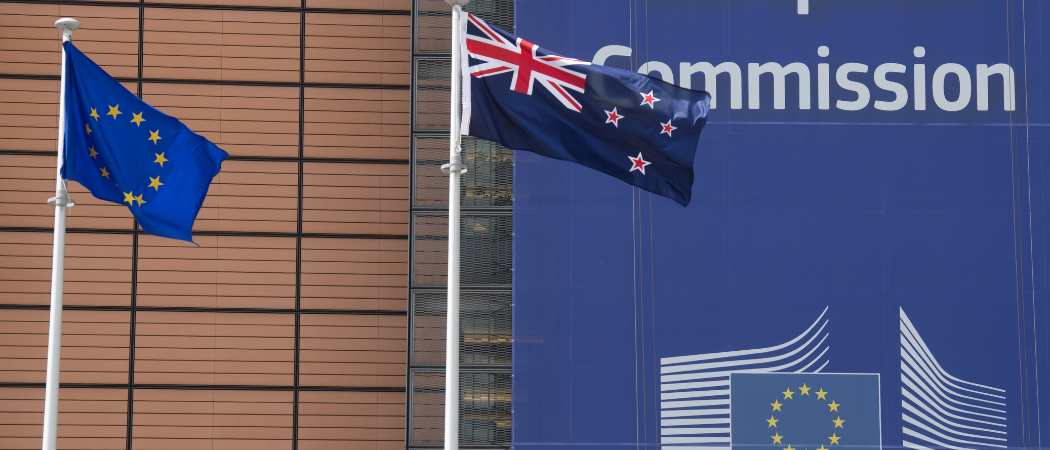Wellington and Brussels are still working on the final details of New Zealand’s participation in Horizon Europe, but researchers and innovators can start to apply for grants

European Union and New Zealand flags in front of the Berlaymont building in Brussels. Photo: Mauro Bottaro / European Union
A transitional arrangement means researchers in New Zealand can apply for Horizon Europe grants as of now, even though Brussels and Wellington have yet to fix a budget following the agreement last December under which New Zealand became the first country to secure full association to the research programme.
“There has been no [budget] announcement as the proposed association agreement is still to be considered by the New Zealand Cabinet and the EU Council of ministers,” said Loveday Kempthorne, manager of international science partnerships at New Zealand’s ministry of business, innovation and employment.
However, the ministry has funding available to cover costs for the first year, while the approval process works its way through the mills. “This has enabled us to make a transitional arrangement with the European Commission, so New Zealand researchers can begin applying for Horizon Europe grants now,” Kempthorne said.
A proposal submitted by the European Commission to the EU Council last week, which estimates assigned revenue as part of the budgetary procedure, put the cost of New Zealand’s association at €18.9 million. However, according to a Council spokesman, the document does not represent the final position of the member states.
New Zealand’s government and parliament and EU member states and the European Parliament all have to approve the proposal before the association agreement can be enforced. “Discussions should continue at working party level until a final text can be approved by the Council,” an EU Council spokesman said.
An agreement could be delayed, since Christian Ehler MEP has threatened to mount a campaign to block the association, fearing the deal will deprive the Parliament of a say over any future association agreements between New Zealand and Horizon Europe.
Until all the approvals are in the bag, Kiwi researchers can now apply for calls in Horizon Europe’s Pillar II on equal terms as EU entities, thanks to the transitional arrangement signed in February.
According to Kempthorne, New Zealand’s financial contribution to Horizon Europe will be calculated based on estimates of success rates in winning grants. At the same time, the budget allocated for association can be amended if required. “The contribution will be adjusted as and when needed, based on the actual funding New Zealand researchers are awarded,” Kempthorne said.
The government estimates New Zealand researchers will be awarded 40 to 50 grants between now and 2027, more than double the number of grants the country received in Horizon 2020.
“We believe our researchers will do well with their applications, given New Zealand’s considerable research strengths in the Pillar II thematic areas,” Kempthorne said.
Association blues
While New Zealand is inching closer to a final agreement and researchers can apply for EU grants, the prospect for other democracies joining Horizon Europe is not so rosy.
In the UK, researchers are still in limbo. Participation has been blocked for the past two years, as London and Brussels haggled over the status of Northern Ireland in the EU single market. This issue looked to have been finally resolved at the end of February, but the two sides are hesitating to announce a clear path to an agreement on association.
Switzerland has also been locked out of the programme due to broader political disagreements between Brussels and Bern that began unfolding in 2021 when Switzerland abandoned talks on an overarching agreement governing its relationship with the EU.
In a speech at the University of Fribourg on EU/Switzerland relations on Wednesday, Commission vice-president Maroš Šefčovič said a fresh deal between the two sides “needs to strike the right balance between the interests of the EU and Switzerland.”
“Swiss association in Horizon Europe, the EU's key research and innovation funding programme of some €95.5 billion, would be a priority in the joint way forward,” Šefčovič said. But he warned, this is part of a broader package. “In other words, if we are to move forward on new agreements, including one on Horizon Europe, we need to move at the same pace on all underlying issues in our relations.”





 A unique international forum for public research organisations and companies to connect their external engagement with strategic interests around their R&D system.
A unique international forum for public research organisations and companies to connect their external engagement with strategic interests around their R&D system.